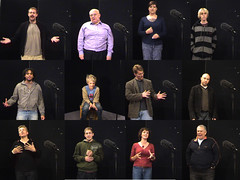Penguin sex, deadly carrots, charity, and grace
(OK, so these three chapters are hard to summarize..:-)
I underlined several great phrases from Chs. 5-7 -- here are my high(est)lights.
"There are plenty of things that are true that don't make any sense. I think one of the problems Laura was having was that she wanted God to make sense." (p.54)
- To what extent do I \ should I seek to "explain" God?
cf. Romans 11:33-34, Isaiah 40, Isaiah 55:6-9, Philippians 4:7, I John 5:20, Colossians 1:9 (keyword search: understanding)
"Our 'behavior' will not be changed long with self-discipline, but fall in love and a human will accomplish what he never thought possible." (p. 86)
- To what extent do I live according to discipline vs. affection (or lack of these)?
cf. Luke 24:32, Galatians 4:15, Psalms 42:1, 73:25, 119:10 (topic search: affections)
Other quotes worth discussing: "I don't want to be charity"(p.84); "we do what we love to do" (p. 77); "things we wouldn't do" (p. 80).

4 comments:
I think I am beginning to see a theme connecting at least last Sunday to our dicussions for this Sunday. At least for myself, there is such a struggle wanting God to make sense and be something I can observe with my five senses that I wage war with my own thoughts from being in love with God to questioning exactly why it is that I believe at all. And yet "at the end of the day" I know that the only real, permanent changes that have ever come in my life are those that I have been willing to release from my will. (i.e. that real sense of being so in love with God that I no longer desire X because I want to completely please him.)
Anne-Marie, I was trying to find examples in my life illustrating what you said. The only thing I could easily think of happened in college. I was going along as a Newbie Christian doing my best. God confronted me with my sinful behavior in a Bible study with my best friend. I felt slapped upside the head, humbled myself and asked God for help. I did not spend the next few months trying to fix the behavior. I just loved God, thanked him for calling me on it and tried to get to know him better. My friend surprised me few months later by reading the same passage to me. And I realized that I wasn't struggling with that issue any more. God was transforming me. I certainly had nothing to do with the change!
I am hoping as I read and as we talk in class I'll think of more ways love of God is changing me. ("Not by might nor by power, but by my spirit says the Lord" - that's the verse I wrote in John's wedding ring)
I agree with all of the above but must admit to being challenged by Chapter 10 -- the part about "what I believe is what I do" (p. 10). Agreed that what we do must be driven by real love of and for God, but either I am not there yet (probable) or the practical challenges are as always more difficult than the theory. For instance, my current excuse is that this particular phase of life (work + 3 kids 5 and under) makes it difficult to showcase belief much, at least in the ways illustrated in the book. Being a good father and co-worker (at least I try) is of course a good thing, but I feel this is not enough. But how to add more? (current illustration: 2 boys pulling on me with, "that's enough computer daddy, I'm going to turn it off right now" -- and if I don't sign off now, he will)
Miller places alot of value on the transforming power of God's love, and for good reason. He is preaching to a specific audience, a young generation of Americans with a seemingly endless appetite to consume and a deep-seated sense of entitlement. Individual freedom and a zealous dedication to the religion of self-empowerment are stronger than any nagging guilt we might feel. In a way, Miller is a salesman. He caters to our weakness and taylors his message so as not to be overly challenging to the dominant ideology. I wonder however, if the story he tells isn't a bit diluted. God's frightening power, his fearsom rod of correction, and the aggressively reactionary nature of the gospel message is largely ignored. Miller's tendency to make startling deferences to American postmodernism deserves our attention. Chapters 5,6,7 are so much about "me", so much less about "us" and even less still about "Him" that I feel unsettled. Does anyone agree?
Post a Comment